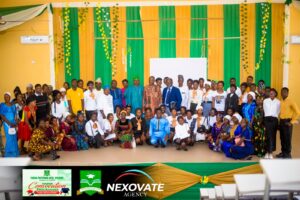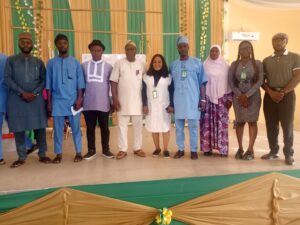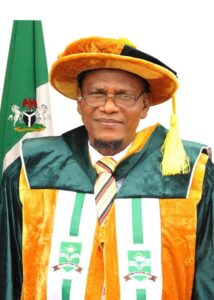
Recently, the Director-General of the World Trade Organisation and Nigeria’s former Minister of Finance, Ngozi Okonjo-Iweala, lauded President Bola Tinubu’s economic reforms for stabilising Nigeria’s economy despite widespread hardship, and called on the government to focus next on growth and protecting vulnerable citizens.
Okonjo-Iweala who made this commet during her visit to the State House in the Federal Capital Territory, Abuja, emphasised the need to put social safety nets in place to shield Nigerians from the impacts of sweeping reforms.
Without doubt, the boldness and political will of the Tinubu led government to address the issues of economic reforms is really commendable. Since May 29, 2023, the present administration in Nigeria has been able to remove long-standing fuel subsidies, unified multiple exchange rates, and addressed central bank financing of budget deficits, policies aimed at fiscal discipline and economic liberalisation.
These moves boosted macroeconomic stability and investor confidence but they also brought painful consequences for citizens in soaring inflation and high cost-of-living.
The direct consequence was one of the reasons for the controversy between Daily Trust newspaper and Federal Government over the August 7 editorial of the newspaper on the issue of hunger. Obviously, when there is high cost of living, there will definitely be hunger as a result of a badly affected purchasing power.
There is a common saying in Yoruba land that, ” he who is hungry does not need any sermon.” What such person needs is food and immediate action to get food to his table.
In seeking ways to protect the vulnerable from the hardship occasioned by the various reforms, the Federal Government should endevour to sincerely ask the following questions: what is happening to poverty? What is happening to inequalities? What is happening to unemployment? These are factors that give rise to hunger in a country.
If the media and public relations handlers of the Federal Governmment will conduct communication research to feel the pulse of the people, the feedback will be alarming. And since feedback is an important component among the elements of communication, it would help the Tinubu administration to have a better understanding of the living conditions of its citizenry.
It is, therefore, expedient for government to give a pride of place to the issue of safety nets that will bring relief to citizens. In doing this, the federal government should courageously put a round peg in a round hole without leaving any stone unturned.
It is no news that the Federal allocation being distributed to states and local government on a monthly basis is more than double the previous earnings prior to Tinubu’s era in office.
Unfortunately, the 774 local government areas in Nigeria are yet to have their full autonomy in practice in line with the judgment of the Supreme Court of the Federal Republic of Nigeria. For whatever reasons, the local governments that make up the third tier of government in Nigeria are still subject to significant influence and control by state governments. The Apex court rulings supported financial autonomy for local governments, but their administrative and overall autonomy remain limited.
The Federal Government should know that the importance of three arms of government is not just for the records but for impacts that will be felt on the streets and villages. As such, there are limitations to what the Governors can do when it comes to poverty allevaition that will get to the real grassroots and hinterland.
Even developled countries do not joke with municipality and county which are the closest to the people since they understand the essence of governance is to touch lives postively. If this Tinubu government will make a mark that would be commendable by all and sundry, it should boldly take the step that will give full autonomy to the local government irrespective of the opinions of the high and mighty who have opposing views.
Incidentally, President Tinubu passionately displayed his knowledge of the importance of grassroots governance during his tenure as Lagos State Governor when the Federal Governmment under the leadership of the then President Olusegun Obasanjo denied the state of its allocation. Asiwaju Tinubu creatively thought out-of-the-box to generate revenue to fund the state and went as far as coming up with Local Council Development Areas which are still standing tall till date.
The Special Adviser to the President, Mr. Sunday Dare in putting record straight on the Daily Trust Editorial mentioned that three million families had been assisted with N75,000 each by direct transfers with plans to scale up to 15 million, adding that the Presidential MSME Grant Scheme has disbursed funds to over 250,000 businesses in 2025, supporting small and medium-sized enterprises despite the outcry on CBN interest rates.
While these moves are lofty, I am confident that distribution will be more efficient if there is a stronger local government involvement and not one Federal Ministry relating with State Ministry which has little or no knowledge of the rural dwellers orientations.
Besides, how did government determine the need of people without direct interaction? Development Communication preaches the need for direct interaction that will involve focus group discussion with stakeholders, advocacy visit to communities on market days, attending community meetings for sensitization, among others. These channels will help the leaders to have a sound knowledge of the people’s needs.
Otherwise, if you go ahead to think for them, you are only doing what you think is thier problem when you are not actually solving their problems.
The government, therefore, should research into the actual needs of the people and stop thinking for them.
Sadly in Nigeria today, the prices and tariffs of almost everything have skyrocketted but for the salary of government workers as far as I know. President Tinubu promised living wage during his electioneering campaign. I do not need to be told that the so-called salary increase of 2024 was a farce. An addition of N40,000-N42,000 on workers salaries without following the normal accounting protocols cannot be a safety net that can cushion the effects of any hardship.
The popular joke of the Senate President, Godswill Akpabio, ” let the poor breathe,” is a major point to note in coming up with safety nets that will assuage the fear of Nigerians. Today, the wider gulf between the poor and the rich is more noticeable just as the middle class in the society is fast being wipe out to join the league of the poor.
Poverty has far-reaching and devastating effects on individuals, families, and communities, impacting various aspects of life including health, education and social well-being. It increases the rate of insecurity, kidnapping, rutual killing, among others.
If the poor will breathe, government should also be ready to address the high cost of items and untowards tarrifs increase of some services. And the beneficiaries should be all citizens, regardless of political affiliation. Also, safety nets should not necessarily be about distributing palliatives but making the economy “habitable” for citizens.
Femi Onasanya, a public affairs analyst and Development Communication Expert wrote via femibimboo@gmail.com







